Here at Mention, we’d be the first to tell you how important digital marketing has become when it comes to doing business in the modern age.
As more companies shift their marketing efforts online, looking beyond the ways to use various marketing channels and deeply examining the intricacies of social media PR and affiliate marketing, it’s critical that they also prioritize cybersecurity.
After all, a data breach or cyberattack can completely derail a company’s digital marketing strategy. A devastating breach that impacts consumer or client data can also jeopardize a company’s reputation and leave them financially in the red, particularly if they are subject to heavy data protection fines from industry regulators.
The point is, if you run digital marketing campaigns in a competitive and cutthroat industry where public scrutiny is often expected, you cannot afford to be lax when it comes to your cybersecurity strategy. Whether you have an in-house team of IT and cybersecurity experts or you rely on professional services like penetration testing and vulnerability assessments from third-party specialists, your cybersecurity posture can make or break your digital marketing efforts going forward.

In this article, we’ll explore why cybersecurity matters for digital marketing success and how the two should work hand-in-hand.
Table of Contents:
- Why Digital Marketing Requires Strong Cybersecurity
- Types of Cybersecurity Risks That Affect Digital Marketing
- Benefits of Building Stronger Cyber Resilience
- Can Cyber Best Practices Boost Digital Marketing?
- Aligning Cybersecurity and Digital Marketing Strategies
- Problems from Misaligned Cybersecurity and Digital Marketing
- Integrated Cybersecurity and Digital Marketing
Why Digital Marketing Requires Strong Cybersecurity
Digital marketing relies heavily on data and insights from various marketing channels, concerning engagement, clicks, impressions and more. From analytics to A/B testing, data powers everything from campaigns run on social media platforms to your business’s entire SEO and content marketing strategy.
This data is incredibly valuable for understanding customers and fine-tuning marketing campaigns, which are never truly one-and-done. Most businesses need to demonstrate the ability to adapt to changing times and industry trends, and adjust campaigns accordingly. Failing to do so means businesses risk being left behind, as well as becoming prime targets for cybercriminals.
Therefore, being flexible and willing to adapt will benefit you from a digital marketing standpoint as well as bolster your cyber resilience.
Here are some key reasons why digital marketing and cybersecurity go hand-in-hand:
Customer Data is Vulnerable
Email addresses, names, phone numbers, locations, purchase history – this kind of customer data is a goldmine for hackers. A breach could expose customer information to bad actors who intend to use that data maliciously, and subsequently erode any trust or faith in your brand, not to mention cause legal issues and hefty regulatory fines.
Brand Reputation is at Stake
If a company suffers a cyberattack, customers may question its security and competence. In much the same way as if their individual details were compromised, the collective opinion about your brand reputation could change if your systems were revealed to be lacking in appropriate security controls.
Campaign Tools Contain Sensitive Info
Digital marketing platforms, such as website content management systems (CMSs), social media analytics tools, email services, and even integrated CRM software contain troves of personally identifiable data that hackers want. Securing any and all incumbent platforms while ensuring the integrity of any integrations is vital.
Digital Assets are Easily Compromised
Hackers gaining access to branding assets, ad creative, and other digital content could manipulate and misuse them across the web. It could be sold to bidders on the dark web to then create product knockoffs, imitations, or conduct phishing campaigns on users where hackers are disguising themselves as legitimate stakeholders.
Traffic Loss After an Attack
Site crashes and outages from instigated server attacks or malware could significantly disrupt traffic and campaigns. Metrics could be negatively impacted, while unsuspecting users could unknowingly enter their data into systems that are temporarily unsecured, meaning that their financial or personal information could fall into the wrong hands instantly.
As this shows, compromised cybersecurity puts all digital marketing efforts at risk.
Types of Cybersecurity Risks That Affect Digital Marketing
Digital marketing campaigns of all shapes and sizes face an array of cyber threats across the space. This includes, but is not limited to:
- Phishing attacks – Emails or websites masquerading as trusted sources to steal login credentials or spread malware.
- Third-party data breaches – When marketing platforms or partners suffer data breaches exposing customer info.
- Domain name system (DNS) hijacking – Malicious redirection of website traffic away from legitimate servers.
- Distributed denial of service (DDoS) attacks – Overwhelming sites and servers with traffic to cause outages.
- SQL injections – Inserting malicious code into databases to extract data.
- Cross-site scripting (XSS) – Injecting scripts into sites to collect sensitive user data.
- Insufficient authentication – When poor identity and access control allows unauthorized access.
- Clickjacking – Concealing hyperlinks to trick users into providing data or downloading malware.

Benefits of Building Stronger Cyber Resilience
While the dangers of improper cybersecurity remain stark, with some careful consideration, proper planning and sufficient investment, your business can mitigate many of the risks while still reaping the benefits of optimized digital marketing campaigns.
Improving cyber resilience offers many advantages, including:
- Enhanced customer trust and loyalty – Customers will reward companies that protect their data with continued referrals and purchases.
- Competitive edge – Leading security practices differentiate companies in a crowded digital marketplace. Those who prioritize security stand head and shoulders above those who don’t.
- Mitigated business disruption – Quickly containing cyber incidents allows digital marketing to continue with minimal or no disruption.
- Compliance – Many regulations and contracts require baseline security controls to be set up from the outset.
- Cost savings – Data breaches cost companies an average of $4.45 million, according to IBM’s 2023 report. Good security saves money.
- Protected intellectual property – Securing digital assets safeguards valuable intellectual property like branding, products, infrastructure and ad creative from theft.
- Reputational benefits – Cyber-savvy companies earn positive press, investor confidence, and talent recruitment advantages.

Can Digital Marketing Efforts Be Boosted With Cyber Best Practices?
Yes, proper cyber hygiene provides many digital marketing advantages:
- SEO – Having a website secured with valid SSL/TLS certification ensures that it stays protected from threats like malware, not to mention helping with search engine rankings. This is especially vital if websites are to be the central hub of marketing activity and online conversions, with encrypted payment gateways needed.
- Social media marketing – Locking down social media accounts prevents hacks that could damage brand image. This requires consistency in validating all user access requests and campaign engagements to ensure that they correspond to legitimate users and not bots.
- Email marketing – Authentication and encryption to secure subscriber data and prevent phishing scams. Social engineering attacks can be born out of seemingly innocuous email correspondence, so it’s vital to ensure that security and validation are at the forefront of any campaign.
- Personalization – Safely collecting customer data enables more targeted, relevant messaging. Demonstrating transparency and openness when it comes to using collected data ethically and not maliciously will also work wonders in ensuring marketing messaging is not lost in translation.
- Agility – Good security empowers fast and timely responses to emerging industry trends without putting the company at undue risk. Displaying security accreditation and certification also reinforces customer trust and confidence in your brand, meaning they will have the utmost faith in your brand should campaigns suddenly switch.
Therefore, it’s clear to see that following cybersecurity best practices gives digital marketing efforts a critical edge at both the campaign level and strategic level.
Aligning Cybersecurity and Digital Marketing Strategies
To fully protect all online campaigns and aggregated audience data, cybersecurity must become an integrated part of your business’s marketing strategy.
Here are some ways to align these priorities and ensure the integrity of all your assets remains uncompromised.
Make Security Part of Campaign Planning
When mapping out campaigns, also assess potential security risks and how to safeguard against them. Look for any and all potential loopholes and vulnerabilities when it comes to collecting and validating data, and ensure that you do not risk breaching your own watertight internal or regulatory policies of data protection.
Conduct Cyber Risk Assessments
Identify vulnerabilities across digital systems, software, processes, and teams through comprehensive vulnerability assessments and penetration testing. Patch all systems, devices and software regularly to ensure known weaknesses are accounted for and not open to immediate risk from malicious actors. Where applicable, apply strong password policies, stringent access controls, and multifactor authentication (MFA).
Train Employees in Security
Educate teams on the cyber threat landscape and emerging threats that they may not be aware of. While some employees will be cognizant of data protection, others may not be as acutely aware. Make sure they all know the recommended security practices for their own data, as well as that of the business and its consumers. Also, train them on how to identify phishing or social engineering tactics, as most of these kinds of cyberattacks occur due to lapses in human judgment.
Encrypt Sensitive Data
Protect customer info, credentials, and other vital data through tested and valid encryption methods. Ensure that all data in transit and at rest is safeguarded by valid encryption protocols like SSL or TLS, and make sure that any certification is achieved ahead of renewal dates.
Use Secure Digital Platforms
Carefully vet any digital marketing software for security features and protocols before use. Make sure you validate any developers if your chosen software does not belong to an industry name, and ensure that it’s rolled out and tested before widely deploying it to hold any customer data at scale.
Have an Incident Response Plan
Map out a detailed response plan for different cyberattack scenarios to minimize potential impacts. Use SIEM tools, anti-malware software, and threat intel to constantly monitor systems and traffic for potential threats. Consider using uptime solutions for any in-house or cloud-based servers to ensure that they remain operational, and any downtime is not instigated by any potential attack vectors.
Taking these steps will integrate cybersecurity into all marketing initiatives from the start.
Problems that Arise from Misaligned Cybersecurity and Digital Marketing
Neglecting cybersecurity in digital marketing plans invites many risks, such as:
- Loss of customer trust and loyalty – Customers will likely take their business elsewhere after a major data breach.
- Damage to brand reputation – Cyber incidents tarnish a company’s image as technologically competent and security-focused.
- Fines and legal issues – Data breaches often lead to lawsuits, fines, and regulatory investigations.
- Impacts on revenue – Cyberattacks can disrupt eCommerce and cause significant financial losses, particularly during boom periods of business.
- Compromised data and assets – Hackers can manipulate or destroy valuable customer data, creative assets, and intellectual property. Retrieving and restoring these assets can be challenging, expensive and time-consuming.
- Hijacked online accounts – Social media and other digital accounts may be taken over to distribute malware or malicious content.
- National security risks – Geopolitically-motivated cyberattacks seek to destabilize businesses, individuals and infrastructure, particularly during turbulent or disruptive times of economic or political instability.
For long-term digital marketing success, cyber threats cannot be ignored. They must be treated with the same strategic importance as search, social media, and other cornerstones of online marketing.
The Path Forward: Integrated Cybersecurity and Digital Marketing
As digital marketing efforts expand and become more innovative, dynamic, data-driven and complex, companies must take an integrated approach that puts cybersecurity on equal footing.
Marketers must proactively approach new marketing channels, campaigns and audience insights while simultaneously preserving data integrity and long-term cyber stability.
This means:
- Making security a core component of digital strategies and campaigns.
- Investing in cybersecurity personnel, tools, and training.
- Conducting regular risk assessments, audits and tests.
- Creating detailed incident response plans.
- Educating all employees on security best practices.
- Building security into new software and technologies.
- Monitoring systems closely for threats and anomalies.
- Working cross-departmentally to unify cybersecurity and marketing.
- Establishing consistent cyber awareness and upholding standards.
With a commitment to these principles, companies can thrive digitally while keeping customer data, brand reputation, and marketing assets protected from emerging cyber threats.
Ultimately, success in the competitive and evolving digital marketing space cannot be achieved without demonstrating proper cybersecurity. You must evolve with an aligned, multi-layered approach to both cybersecurity and digital marketing to enable your company to connect with more of your customers while preserving their data and avoiding disasters.






